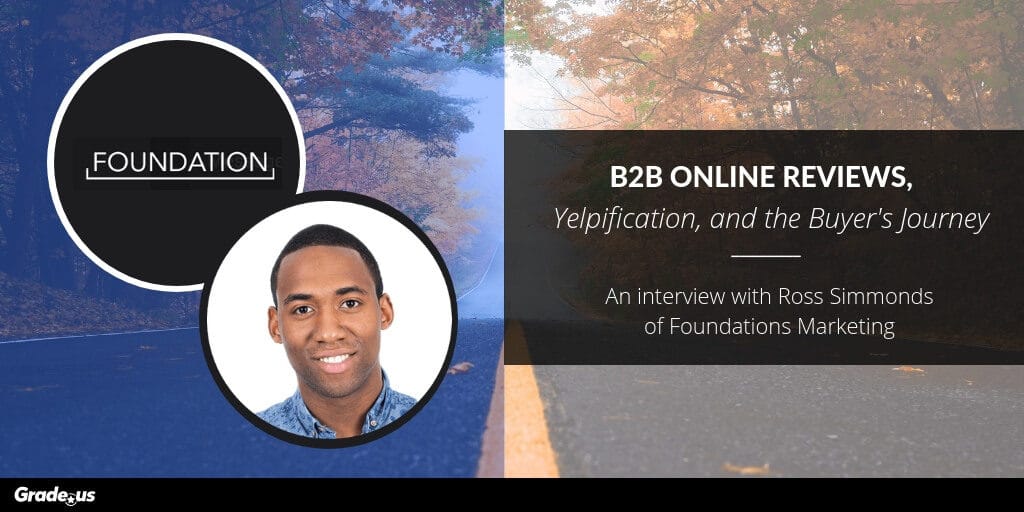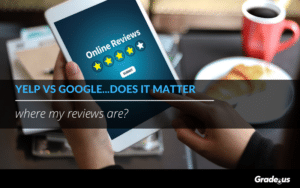Last week, I had the privilege of speaking with Ross Simmonds of Foundations Marketing. We talked about the Yelpification of B2B, how businesses can prepare themselves for reviews, and how online reviews are an opportunity and a major competitive advantage.
Ross knows a thing or two about B2B marketing. He feels strongly about the changing buyer’s journey for B2B businesses and how online reviews are a part of that experience.
Check out Ross’s video where he shares his thoughts on this marketing channel for B2B:
On the changing landscape of B2B Marketing
Garrett: Let’s start from the beginning, Ross. You work with B2B companies and have been for awhile. I want to begin our discussion around how the consumer/buyer’s process has changed for B2B companies over the last 5 years in the digital marketing space.
Ross: Yeah, so, it’s definitely changed quite a bit in terms of the way the buyers are behaving and the way that the buyers are finding the solutions that solve the problems.
If anything, it’s the consumerization of B2B which is happening.
That’s been happening over the last 5 years, where in the past, it was very much a cold call game. It was very much a game where you would take people out for dinners, and try to schmooze them, and play that game. That often was how B2B sales were done.
But the world of inside sales has really changed a lot of that. It was probably about 5 years ago when things started to quickly change from being all about the inbox. It was all about us sending emails, building relationships through social, LinkedIn, etc.
The way that we buy and the way that we sell, as a result of that, has significantly changed. Another factor that has influenced the shift has been Google and the rise of search. It’s easier for buyers to find out anything they want around your software, around your service, around your solution directly through the Internet.
You’re no longer relying on the Gartners of the world to provide you with a report on whether or not you should buy a certain software. You’re able to access the Internet and ask your friends on LinkedIn. A lot of people have Slack communities with professionals who are in their space and they can ask them questions.
Most buyers are going to go to Google and simply looking for reviews on different sites. The entire way consumers from a B2B lens are buying has shifted and changed.
On the sophistication of the B2B buyer when evaluating vendors
Garrett: It’s really interesting. To your point, it’s not just technology. It’s this evolution of the way that people interact with technology, specifically in the search ecosystem.
Are people becoming more sophisticated? What are they looking for when they’re evaluating a B2B solution or vendor?
Ross: So they’re definitely becoming more sophisticated.
When somebody researches your business to the point where they’re actually scheduling a demo or they’re hopping on a call, you can safely assume they’ve already done a significant amount of research.
They’ve looked at your competitors, they’ve looked at your pricing pages, they’ve talked to some of their colleagues, they’ve learned a little bit around what your onboarding process will be like. People are spending a lot of time up front to understand what your space is all about.
And this isn’t just SaaS.
This is the reality, whether we’re buying products for our own homes, whether we’re buying a new book. People, in general, are doing more research, because there’s more information at our fingertips to make better decisions.
Nobody wants buyer’s remorse.
So people are spending that time up front. Employees are even being tasked within organizations to spend that time before they jump on a call, by going out, doing the research, talking to people in their network, and spending the time to send emails to partners and colleagues to get answers to questions that they have around what solution is right for us at this size.
Without question the buyer is more sophisticated, and with that sophistication of our buyers, comes a more sophistication from us as marketers to understand:
“How can we reach them on all of these different channels that they’re spending time on to learn about us?”
How can we ensure that the story that they’re receiving aligns with what’s going to move them through the marketing funnel?
On who the researchers and decision makers are for B2B organizations
Garrett: That’s a really great point, this whole idea of the story and who’s looking at the content about your business.
So specifically with B2B, and naturally it depends on a) the industry and b) the company size, but who in the organization is typically the first touch?
Who is going out and starting to research possible solutions, and who ultimately is the decision maker with a lot of the consumers that you’re working with?
Ross: Yeah, so that’s a great question. It’s interesting, because it’s very fragmented. It’s a fragmented market, because different solutions require a different type of buy-in.
For example, if you’re trying to sell a marketing tool that is $12.99 a month or something of that nature, you’re probably finding that pain inside of a social media manager.
That social media manager might be looking for, “How can I better manage all of these different accounts?” That is going to start with maybe a Google search. Then they’re going to land on a blog post that talks about 10 of the top social media manager tools. Then they’re going to click on a link and they’re going to go to your website and they’re going to open up a bunch of tabs with other sites.
They’re going to try to see which brand they resonate with. They’re going to see who has the better pricing, etc. They’re going to think that through. In some organizations, they’re going to have a thumbs up regardless for a $12.99 product, and they can just go ahead and swipe the company card. In others they’re going to have to take that up a chain and maybe have to get an approval from a manager.
Now, at the same time a $12.99 one time purchase is a very low ticket price item. If you are buying a full-on marketing automation service that could be anywhere from $7.99 a month to $1500 a month. Those are solutions where you probably are looking at the C-suite as being the people who are leading that review, leading that problem and leading the discussion internally to figure out if this is a product they should buy.
Their sign-off may be coming from their CEO, saying, “This is something we need to be more productive,” and they need to make that case internally. Once they get the thumbs up from the CEO or the CFO, they just go ahead and move ahead with that.
It is fragmented, because different companies have different ways of buying things. But in addition to that, it’s also fragmented because of the wide scope of products.
If you’re buying a tool that is meant to manage your one-on-ones with your organization, maybe that’s going to fall under your director of operations. But if you’re looking at somebody who is going to manage your projects in general, that might go down to a project manager level. So it definitely depends on your organization, the products you’re looking at and where they fit in the entire hierarchy within an organization and where people sit in terms of their job roles, etc.
But at the end of the day, I think it’s a very fragmented time, and for that reason, we need to spend time as marketers researching and understanding exactly who our buyers are. We need to understand what channels they’re using to get information, and then aligning our stories with that.
On the online review ecosystem and review management for B2B businesses
Garrett: That sort of segues right into my question about the specific channels. At Grade.us we’re all about reviews.
I want to know where reviews, review sites, and that whole ecosystem play into the buyer’s journey as a channel for B2B businesses? What do you think they need to be aware of in terms of their reviews?
Ross: Great question. So this concept of reviews online is one of, in my opinion, the biggest shifts in B2B over the last decade.
It’s going to continue to shape the way that we buy, and it’s going to have an influence on organizations for years to come. The same way that Yelp changed the way that restaurants are picked, the same way TripAdvisor changed hotels, the same way that Amazon Reviews changed books, I think the review sites that are targeting software companies and service companies are going to change the way that B2B professionals make buying decisions.
Because people trust reviews.
People also want to be heard, so they’re leaving reviews on an increasing level on a regular basis. When you are looking at sites like Capterra, Clutch, and G2, you’re looking at all of these sites where people are leaving reviews on their perspectives around B2B brands.
B2B decision makers are going to these sites when they are ready to buy; when they have an intent to purchase; to better understand what’s the right product for them; what is the right solution for their business.
More than ever before, reviews are important and organizations need to understand two things.
1.) They need to know how to inspire reviews that are from their audience. They need to embrace ways to inspire buyers to leave reviews on a more regular basis.
2.) They also need to know that you shouldn’t be afraid of reviews. Yes, you might get a negative review. You might get somebody saying something negative, but don’t just view it as something you can just leave it up there and hope that it will vanish. You have to then act on that review. Look at what are the items within this that we can use to improve our product, improve the way that we sell, improve our service as a whole. Or, how can we respond back to this review publicly to ensure that anybody else who lands on this landing page and sees our review sees our response and is like, “Wow, they handled that so well that I have to do work with them.”
Reviews are underrated across the entire B2B marketing journey today, and it’s going to play an increasingly important role as the Yelpification of B2B continues to be amplified and continues to influence the way we buy.
On the different value types of B2B online reviews and review generation
Garrett: I think it’s a lot of on-point information you’re providing. I don’t think it’s on the radar of enough B2B businesses.
When we’re talking about the reviews, I’ve found that B2B review sites tend to gather a lot more information than your typical Yelp or Google review. They will provide information like who’s writing the review, rating the cost, the benefits, the drawbacks, etc.
So what is the value of a B2B review?
What’s the value of a review written by a CEO vs. a marketing manager vs. an associate?
And the second part of that, how do you work with businesses to get reviews from those specific audience members? Is that even possible?
Ross: Great question. There’s no question that a review from a CEO, even a C-suite executive, any review from somebody who you as the buyer can resonate with as a job title and like a status perspective, has a lot of value. I have witnessed organizations make hundreds and thousands of dollars worth of decisions solely based off of the fact that they saw a review from a partner or a competitor using a product, and they said they didn’t like a certain element of it.
Hundreds of thousands of dollars, right now, are being lost based off of reviews that organizations are receiving, that are negative. That are consistently showing up.
If you’re an organization that is not spending time optimizing your reviews by trying to inspire people to leave them, you’re missing out. The opportunity also exists for you to use that as internal business intel. You can look at your competitor’s reviews and gain amazing insight on how you can differentiate yourself from them.
But to go back to your question around how you can inspire them, there’s a few different ways that you can do it.
First and foremost, when a client leaves you a review, you want to thank them and you want to thank them publicly.
You want to do that by sending out an email list, or an email maybe to some existing clients, or maybe some of your peers, some people in your network, and just say,
“So and so just left us an amazing review, check this out. If you are ever interested in leaving us a review on G2 or Capterra or Clutch or AgencySpot or whatever it may be, then please engage with us.
We would love to talk with you to set that up and facilitate that.”
Some of these sites are actually allowing for video reviews. If you can connect with your clients and say, “We’ll fly you out and we can record a video interview,” some of them will be interested in that, and that’s rich content that you can use, similar to a case study, but it’s on a review site that’s probably getting more traffic than your case study’s landing page anyway.
There’s a ton of value in doing that, just by reaching out one-to-one.
But you can also inspire those reviews by thinking a little bit critically around at what point does somebody have a positive experience in our application? Can we put a push notification to their device, whether it’s through desktop or mobile, that says:
“Did you enjoy this experience?”
“Yes? Okay. Would you be interested in leaving us a review.”
We’ve all seen that happen on an iPhone when we’re playing with an app. We do something cool, and then the app asks us to rate them, and then from there it asks us to leave them a review in the Apple store. The same thing should work with your product, but instead of thinking about the Apple store, you should be thinking about these sites, where B2B reviews are being housed.
You’re going to inspire your audience and your users to go to these sites and leave you a review, after they’ve done something that’s important within your product.
Garrett: That’s awesome. It’s such a good point. People forget that yeah, there’s the lead acquisition, there’s the marketing component of reviews, but ultimately it’s telling you about your business and how to improve your own business.
That is an opportunity.
If you’re not doing marketing research in the first place, these reviews are going to help you understand your existing audience. You can’t buy better marketing research than that sometimes.
Ross: You can’t. One of the things that we’ve done that is amazing, in terms of the insights you can get is, if you scrape all of the reviews associated with your competitors and even yourself, run an N-gram or trigram analysis, where you’re looking for the most frequently used phrases. You can uncover some amazing insights that solidify benefits you may offer as a product that your competitors don’t even realize or that you have never actually articulated on your landing pages or in your messaging or even in your advertisements.
You notice that maybe in the positive feedback that you’re receiving, it is always stated that ABC is where this company thrives. If you see that trend, over and over again, and it is nowhere in your marketing materials, you’ve just unlocked an amazing new value proposition that you can put in front of a certain group of audience that they will probably resonate with.
Clearly it was important enough for a handful of your reviews to mention that it was the key differentiator for you and your competition.
On properly evaluating your own B2B online review portfolio
Garrett: That’s gold. That’s so cool, to kind of realize there are those nuggets there.
It’s right in front of you, but you just need to sift through like we do with anything in marketing. Sift through the data. Find the data and then kind of exploit it and capitalize on it and help your existing audience.
Finally, if a B2B business is just starting to look at their reputation portfolio, their reviews, how will they know if they have a good review portfolio?
How would they know they have red flags that they need to improve upon? What should they look for on their reviews from a bird’s eye view?
Ross: Yeah, so, typically a lot of these sites are going to have some type of star rating, so you’re going to start with that.
You’re going to see how many stars you have that are 5-star vs. 1-star, if you see that you have a significant amount of 1-stars, then you know that there’s a red flag, and you need to fix some things very quickly. Even if you see that you have a significant amount of 5-stars, maybe a lot of 4-stars, and just one or two 1-star, I would still say spend some time looking at those 1 and 2 stars, because the vast majority of people who check out your review site are going to scan over the volume and see, “Oh, they’ve got some great 5-stars and 4-stars, but meh, let’s see what is deeper and underneath the hood.”
With those negative comments, you definitely have to respond. You have to engage, provide value, show them this matters, because at the end of the day it’s the same interaction that would happen if you walked into a restaurant, except a bunch of people are watching.
If you walked into a restaurant and you said, “Hi, can I be seated?” and nobody talked to you, or you had a complaint and the person at the front desk just ignored you and didn’t engage at all, that would look bad if a bunch of people were there and they just stared at you and didn’t speak back. The same thing exists on review sites.
If somebody is complaining to you, you have to say something back to them. Because people are watching. You can’t just look at them in the eyes and just hope that they’ll walk away. You have to engage, you have to respond, just like you would if they walked into your business from a storefront perspective. That’s where you have to start.
On the best advice for B2B review management and marketing
Garrett: This is awesome. It’s so useful. It really is this disruptive game-changing buyer’s journey for B2B.
To finish up, if you had one piece of information, one piece of advice for a B2B organization that’s starting their reputation management, review management, what’s the most important thing they should know?
Ross: I think the number one thing is to go into this egoless.
That might seem a little fluffy and it’s not very tactical, but it never feels good to have somebody say something negative about you. It can strike your ego and it can make you feel uncomfortable. But it is very important for you to go into this without any ego and just accept the fact that people are talking about you. People are talking about your business, talking about what you’ve built, and you need to take that at face value and try to understand what is it that you can do with this feedback to improve your business, to improve your organization, and even to improve your culture when you get into things like Glassdoor where reviews are happening for CEOs.
You have to look at this stuff and understand that these are real people behind the keyboard, and there’s an opportunity for you to do something to improve on it, to ensure that in the future you’re getting positive reviews from anybody who comes across your brand or interacts with your company.
On connecting with Ross Simmonds and his team
Garrett: Thank you so much, Ross.
If any of our audience wants to work with you and your team at Foundation, how do they find you, what do you do, who’s the best type of candidate to work with your business?
Ross: We primarily work with B2B organizations. That can be anything from a traditional organization that’s working in manufacturing or working in the service side of things, all the way through to high-growth companies that are in SaaS or technology. Those are our bread and butter. B2B is what we live and breathe, and we develop content marketing strategies and implement those strategies through content creation, content distribution, as well.
For folks who want to get in touch, the best way to do so would be to send me an email at [email protected], or check out our website at foundationinc.co. Send us a note with any questions you have around the Yelpification of B2B, I’m also very easy to find on Twitter, @TheCoolestCool.
I love to have conversations with folks. I can geek out about this stuff for hours, any day of the week, and I would love to hear from any of your listeners.










